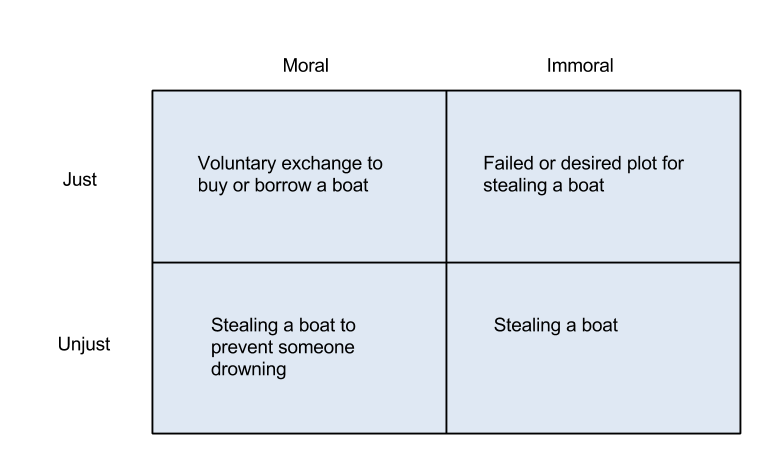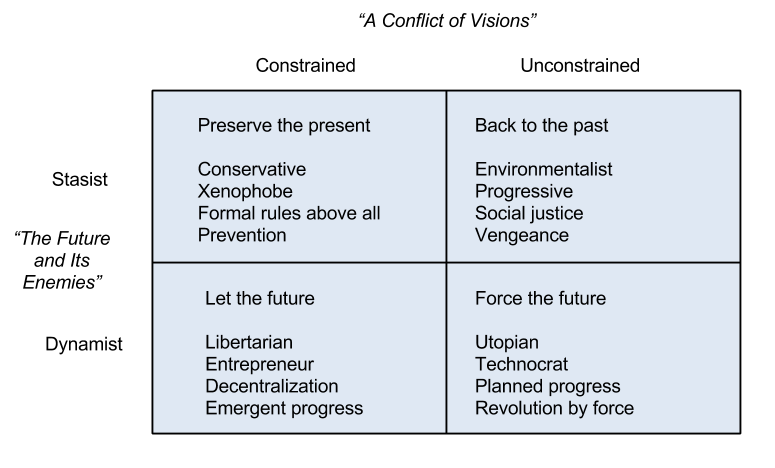Part six in a series of eight on the morality of capitalism.
Capitalism gets saddled with a lot of baggage that doesn’t properly belong to it. Some of this is the result of ignorance of basic economics, some of it a poor reading of history, but most of it is due to a bad definition of capitalism. In the first post in this series I defined what I mean by the term:
[A] system where individuals are free to keep, trade, use, or give away property that was peacefully acquired. This is merely a negation of the use of force in the use and exchange of goods. I do not mean a system that is pro-capitalist, or pro-business, or pro anything but freedom for the individual.
This definition does away with many of the accusations made against capitalism. They may be true of our current system, but not of a genuinely free market. Still, there are a number of claims about capitalism that remain, and I wish to clear up at least a few of the common errors.
Capitalism is not a zero-sum game. For someone to win, it does not require someone else to lose. It is easy to observe a person who has done well and assume that there must be persons elsewhere who had to lose something in order for this person to have gained. That is true of every political system and many simulated scenarios like sporting events, but nothing could be further from the truth in a market.
When exchange takes place in a free market, both parties trade something they want less for something they want more. Of course, either may change their mind later and regret the decision, but at the time of the trade both parties valued what they got more than what they gave, otherwise they would not have traded. It is easy to see how value is created on both sides (because economic value is subjective), and how there was no “loser.” Beyond this simple illustration, over the long run the wealth generation of capitalist trade grows the overall pool of valuable resources and increases choice for all involved. This means the potential for more and bigger “wins” as time goes on and specialization and trade increase. Wealth is created, not distributed.
Capitalism is not for the rich. If there’s any class or group that benefits more from capitalism than any other, it’s not the rich, but the consumer. Of course all of us, rich and poor alike, play the part of the consumer at various times. But it is an inescapable fact that in order to succeed in a market, you must create value for consumers. Ludwig von Mises sums this up nicely:
“The riches of the rich are not the cause of the poverty of anybody; the process that makes some people rich is, on the contrary, the corollary of the process that improves many peoples want satisfaction. The entrepreneurs, the capitalists and the technologists prosper as far as they succeed in best supplying the consumers.”
The rich do not live at the expense of the poor, nor do the rich feel particularly secure in a free market; they often seek government intervention to protect them from competition. But any gains to the rich not only are the result of creating value for the consuming public, they often lead to direct benefits for the poor over time by way of lower prices and access to new technologies.
Even the most selfish, peasant-hating rich person wants to buy fancy new luxuries. Whether they like it or not, being early adopters of such goods helps fund the continual production, research and development of new technology and can bring the cost of production down over time. There is not a modern convenience in existence that did not begin as a plaything of the super-wealthy. TVs, cars, washing machines, cell phones, etc., ad nauseam. If there were no wealthy customers around to purchase these impractical items, it would have been nearly impossible for producers to continue to refine them and lower the cost of production. Rich and poor can certainly dislike each other in a free market, but they cannot avoid helping each other.
Capitalism doesn’t concentrate power. Capitalism disperses power. If you look at the list of Fortune 500 companies 50 years ago vs. today’s list, you’ll notice some familiar names. You’ll also notice that the majority of top players 50 years ago don’t make the list today, and a great many of them don’t even exist. There was a time when Sears threatened to dominate the entire retail industry through its innovative catalog approach. The previous big players in the retail scene, themselves viewed by some as invincible, were put under by Sears. Is Sears a retail hegemon today? Neither will Wal-Mart be tomorrow.
Capitalism is relentless, and consumers want value. They may have brand loyalties, but those only go so far. At the end of the day, the dynamic process of creation, imitation and destruction constantly wreak havoc on the best predictions of who will control the market into the future. Were it not for massive government interventions—including things like anti-trust, which is purported to break-up vested interests but typically does the opposite—we would see even more dynamism and less concentrated power.
It may be a bit disconcerting to realize how dynamic the free market is. The good news is while corporations and products and methods of production are created and destroyed all the time, the human and material resources in the economy are redeployed. It may cause temporary dislocation, but the transition from buggies to Fords was very good for market participants, even though it killed some buggy companies.
Capitalism isn’t about taking advantage of people. In fact, it’s about people taking advantage of the opportunity it provides. I used the example in a previous post of price gouging. Higher prices after a disaster are sometimes seen as an example of people being fleeced by the market when they are the most vulnerable. But when we understand what’s actually happening when prices rise—those less desperate are encouraged to conserve so those who need resources most can get them; suppliers are signaled to deliver more goods to the affected area, etc.—we see that the market is doing more than any other system could to provide for those who need it most.
I’ve heard people talk about the way that businesses take advantage of employees and force them into subpar working conditions. Of course we all have to make choices, and we all wish our options were better than they are (which is why we work to improve them). But is it true that capitalism allows companies to take advantage of people’s needs? Possibly, but no more than people take advantage of companies’ needs.
If you’ve ever shopped at Wal-Mart, supposedly one of the worst offenders when it comes to taking advantage of employees, you’ve noticed that most of the employees are not very helpful. I once waited for 30 minutes to pick up something ordered online. The store was not busy and four or five employees saw me there and did nothing. A few said they were going on break and someone else would help me soon. Some said nothing and just walked past, even when I tried to get their attention. When someone did arrive she was discourteous and messed up the check-out several times. I am far less likely to order from Wal-Mart after this experience.
If Wal-Mart is so good at exploiting employees, why were they unable to make them shorten their break to help me, or treat me with basic kindness, or master the proper checkout procedure? The answer is that Wal-Mart is not any better at getting what they want out of employees than employees are getting what they want out of Wal-Mart. The ease and regularity with which employees quit in the retail business is staggering, and employers often have to tolerate a lot of behavior that is detrimental to their profits to keep needed workers.
I don’t like to moralize about who’s exploiting who, but if we’re going to play that game we ought to consider the many ways in which employees, consumers and shareholders take advantage of managers, investors and corporations. It happens in both directions, but in a free market both are difficult to sustain in the long run. You have to serve other market participants, not cheat or exploit them. It’s not perfect, but capitalism does a better job of generating cooperation and limiting exploitation than any other system.
Capitalism doesn’t corrode our souls. Sure, free markets give us more choice and make us wealthier, but don’t they also make us crude, materialistic and shallow? It is true; in a more abundant market with lower costs, a person can more easily indulge their materialistic impulses. It is also true that countries where few go hungry also have more obesity. The cure is not to restrict the food supply.
A free market forces us to become people of character or suffer the consequences. We have more choices, which means the option of choosing things that are bad for us. But being deprived of choice altogether does not make us better people, just weaker people.
A person who has never lied because their tongue is cut out is not what we hope to become when we strive for honesty. Capitalism cannot corrode your soul, but it can provide you more modes of cultivating and expressing what’s in your soul—good or bad. You can’t escape ultimate responsibility for your choices under any system. Capitalism is up front about that.
Like this:
Like Loading...

